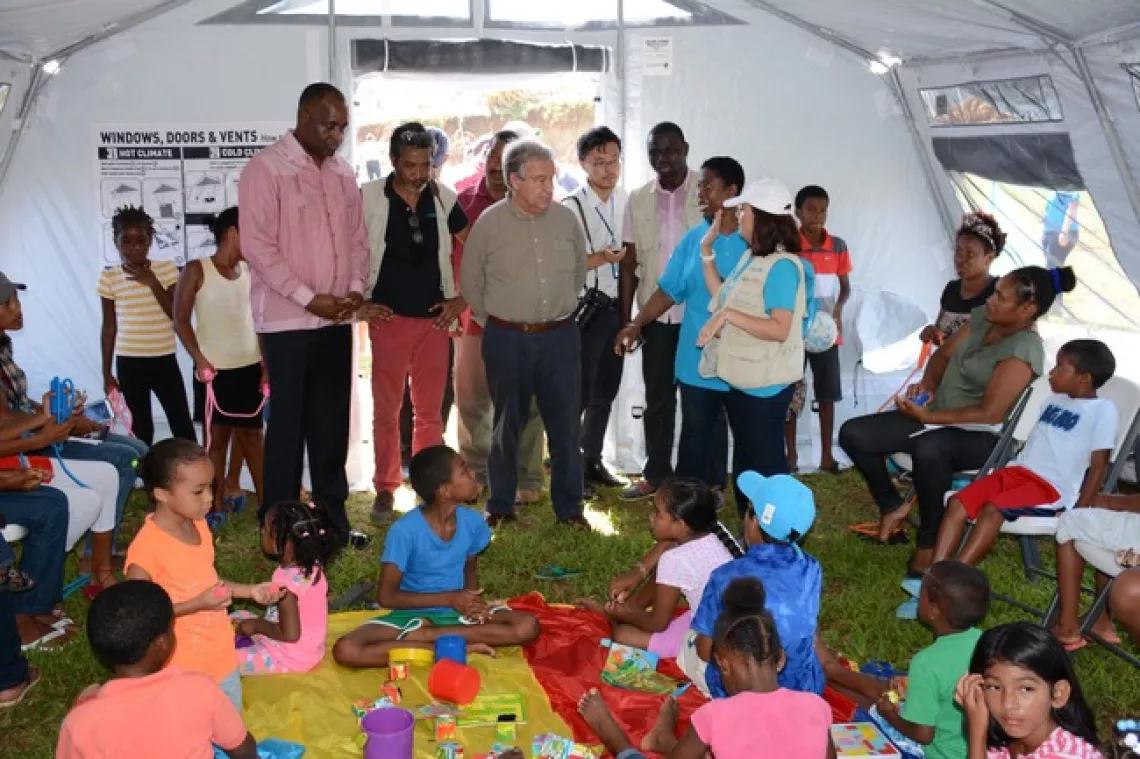Hurricane Maria aftermath: Children's education on hold in Dominica
After Hurricane Maria left an estimated 90% of buildings damaged or destroyed, UNICEF is helping get students back to school as quickly as possible

- Available in:
- English
- Français
UNICEF is scaling up its humanitarian response across Latin America and the Caribbean to help children and families recover from successive hurricanes in the region and two earthquakes in Mexico. After Hurricane Maria left an estimated 90 per cent of buildings damaged or destroyed in Dominica, UNICEF is supporting the government to get students back to school as quickly as possible. Deltin, 16, is one of thousands of students who has been affected.
DOMINICA, 13 October 2017 – Deltin Eugene, 16, stares at the chalkboard at the front of what used to be his classroom at the Goodwill Secondary School. The only words written there are “Friday 15 September 2017”. It was the last day he and more than 18,000 other students in Dominica went to school.
When classes were dismissed that Friday afternoon, he had no idea that Hurricane Maria’s 160 miles per hour winds would shear the roof off his school and throw the completion of his secondary school education into question.
Missing roofs, broken windows, books and desks lie strewn all around the school compound. An estimated 90 per cent of buildings on the islands were damaged or destroyed – and the schools weren’t spared.
“This was not imaginable. […] the destruction I’ve seen since this hurricane is something I never thought I would see,” says Deltin, whose family also lost their home. “When I first saw the damage at my home and island-wide there was fear, but then I thought again, we rebuild. We can do it again; rebuild stronger.”
Education on hold
Deltin is in his final year of secondary school education, preparing for examinations in nine subjects. He worries the prolonged school closure will defer his and his classmate's dreams.
“It’s very worrying because I want to finish school and move on to college and make a life for myself, but school is at a standstill and I don’t know when we will be able to get back on track,” he says. “I would really like school to be rebuilt fast or they find temporary spaces for school.”
Unfortunately, Deltin and the other students may have to wait longer before they can return to school. In the aftermath of the category five hurricane the government is weighed down with conducting search and rescue operations, providing water and food across the island, and reopening access to several communities that were cut off by damaged roads and collapsed bridges.
A number of schools are also among the 130 official shelters that are providing a safe haven for the 2,500 people who lost their homes in the hurricane. Deltin lives in one with his mother Angela and brothers Sarael, 14, Jervon, 11, and Jaden, 9.

United Nations Secretary-General António Guterres (centre) visits a UNICEF Child Friendly Space during a trip to Dominica in October 2017.
UNICEF assistance to get students back in school
UNICEF is on the ground to support the government's damage assessment of 76 government-owned primary and secondary schools, and develop a plan to get students back to school as soon as possible.
There are plans for around 25 schools, which suffered moderate damage or have been used for shelter, to reopen later this month. Other schools will reopen in phases once repair works have been completed.
In the meantime, UNICEF is providing temporary learning spaces and classroom equipment with tents and school-in-a-box kits.
As examinations are due to be sat region-wide in just over six months, Deltin and his friends will hopefully be back in school soon.




